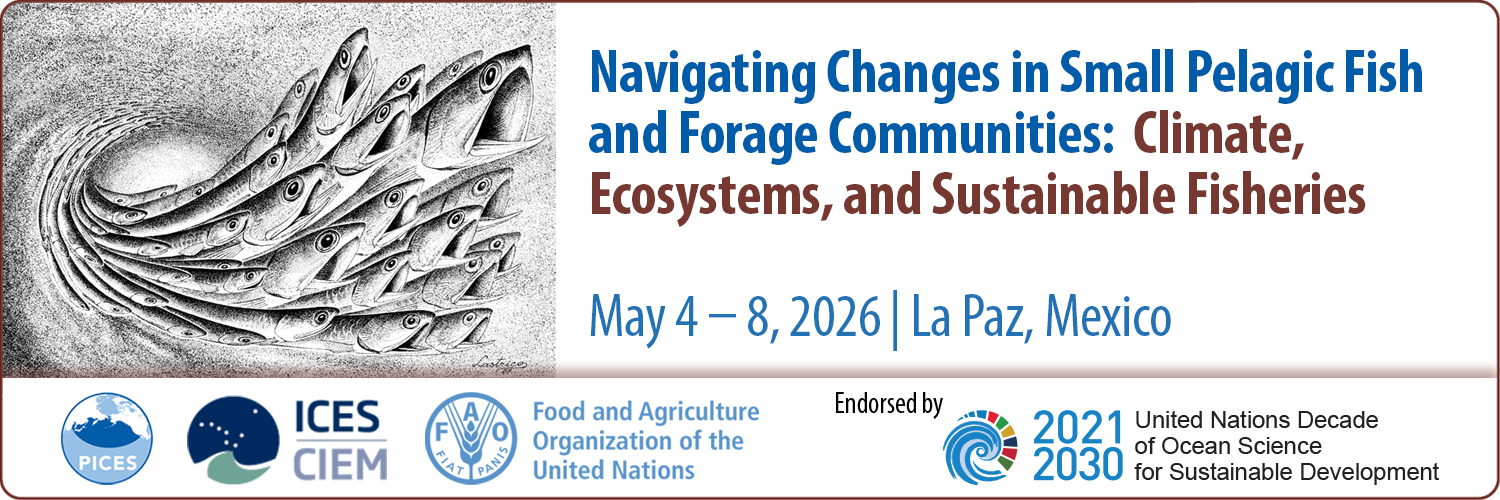
Scope
Small pelagic fish (SPF) constitute over 30% of the total catch in global fisheries, making them a pivotal component for sustaining food security worldwide. Together with other forage species (e.g., squid, myctophids), their significance extends beyond mere sustenance, since forage species are key for energy transfer within food webs. Consequently, understanding the intricacies governing their population dynamics and ecological roles remains imperative for fostering robust management practices. Over the past five decades, concerted global research endeavors have shed light on these aspects for SPF, revealing important insights and identifying critical knowledge gaps – notably that less research has focused on dynamics of forage species beyond SPF.
One noteworthy revelation from global analyses is the oscillatory nature of SPF productivity, often attributed to climate variability spanning seasonal to multi-decadal scales. Such fluctuations, in line with other forage species, have profound ecological and socioeconomic ramifications, underscoring the interconnectedness of forage species dynamics with broader environmental processes. Leveraging comparative studies across diverse geographical regions offers invaluable perspectives for refining management strategies.
Scientific advancement in comprehending forage community dynamics is ongoing, utilizing an array of tools and methodologies. Integration of numerical models with extensive monitoring data and stock assessments enhances our ability to explore hypotheses regarding population variability. Furthermore, innovations such as eDNA analysis, machine learning, and genomic studies present promising avenues for unveiling nuanced aspects of forage species ecology. Collaborative efforts involving stakeholders from various sectors are instrumental in devising effective regional management approaches tailored to specific social-ecological contexts.
The international symposium, titled Navigating Changes in Small Pelagic Fish and Forage Communities: Climate, Ecosystems, and Sustainable Fisheries (SPF-2026), will be the third meeting in the Small Pelagic Fish Symposium series initiated in order to reunite a community of scientists and managers who work to improve the ecological understanding, management, and future status of SPF and other forage species populations in marine and inland systems. The first symposium in the series, Drivers of Dynamics of Small Pelagic Fish Resources, was held in March 2017 in Victoria, Canada (SPF-2017), and the second, Small Pelagic Fish: New Frontiers in Science and Sustainable Management, took place in November 2022 in Lisbon, Portugal (SPF-2022). These symposia attracted scientists from six continents – 237 participants from 31 countries came together for SPF-2017 and 288 participants from 39 countries attended SPF-2022.
SPF-2026 aims to showcase recent advancements in SPF and forage communities research. By delving into topics encompassing ecology, population dynamics, climate and oceanic impacts, social-ecological systems, and sustainable management practices, the symposium promises to foster interdisciplinary dialogue and pave the way for informed decision-making in forage species conservation and utilization.
The symposium complements collaborative research conducted by the joint ICES/PICES Working Group on Sustainable Pelagic Forage Communities (PICES WG53 / ICES WGSPF) and has the potential to contribute meaningfully to the UN Decade of Ocean Science for Sustainable Development, serving as a platform for important discussions on how science can address the current needs for innovative fisheries management strategies and policy responses.
One noteworthy revelation from global analyses is the oscillatory nature of SPF productivity, often attributed to climate variability spanning seasonal to multi-decadal scales. Such fluctuations, in line with other forage species, have profound ecological and socioeconomic ramifications, underscoring the interconnectedness of forage species dynamics with broader environmental processes. Leveraging comparative studies across diverse geographical regions offers invaluable perspectives for refining management strategies.
Scientific advancement in comprehending forage community dynamics is ongoing, utilizing an array of tools and methodologies. Integration of numerical models with extensive monitoring data and stock assessments enhances our ability to explore hypotheses regarding population variability. Furthermore, innovations such as eDNA analysis, machine learning, and genomic studies present promising avenues for unveiling nuanced aspects of forage species ecology. Collaborative efforts involving stakeholders from various sectors are instrumental in devising effective regional management approaches tailored to specific social-ecological contexts.
The international symposium, titled Navigating Changes in Small Pelagic Fish and Forage Communities: Climate, Ecosystems, and Sustainable Fisheries (SPF-2026), will be the third meeting in the Small Pelagic Fish Symposium series initiated in order to reunite a community of scientists and managers who work to improve the ecological understanding, management, and future status of SPF and other forage species populations in marine and inland systems. The first symposium in the series, Drivers of Dynamics of Small Pelagic Fish Resources, was held in March 2017 in Victoria, Canada (SPF-2017), and the second, Small Pelagic Fish: New Frontiers in Science and Sustainable Management, took place in November 2022 in Lisbon, Portugal (SPF-2022). These symposia attracted scientists from six continents – 237 participants from 31 countries came together for SPF-2017 and 288 participants from 39 countries attended SPF-2022.
SPF-2026 aims to showcase recent advancements in SPF and forage communities research. By delving into topics encompassing ecology, population dynamics, climate and oceanic impacts, social-ecological systems, and sustainable management practices, the symposium promises to foster interdisciplinary dialogue and pave the way for informed decision-making in forage species conservation and utilization.
The symposium complements collaborative research conducted by the joint ICES/PICES Working Group on Sustainable Pelagic Forage Communities (PICES WG53 / ICES WGSPF) and has the potential to contribute meaningfully to the UN Decade of Ocean Science for Sustainable Development, serving as a platform for important discussions on how science can address the current needs for innovative fisheries management strategies and policy responses.
Important Dates
Extended Dec. 2, 2025
Notification Deadlines
December 15, 2025
Confirmation Deadlines
May 4-8, 2026
August 1, 2026
PAST October 20, 2025
PAST June 16, 2025